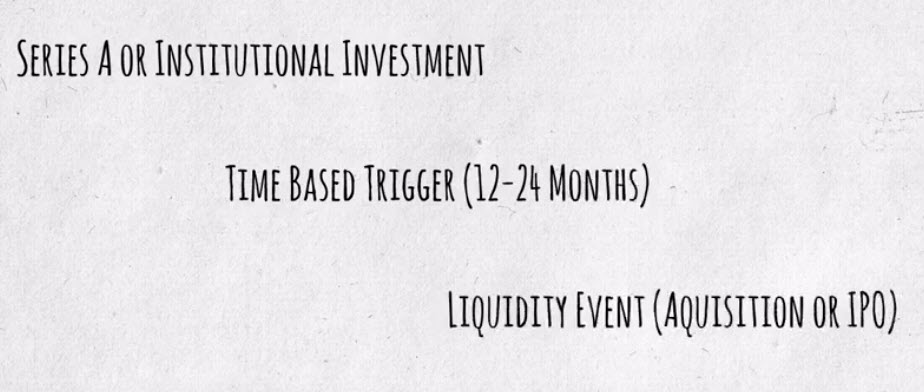(Also, see https://www.upcounsel.com/safe-notes.)
SAFE (Simple Agreement for Future Equity) and KISS (Keep It Simple Securities) are both vehicles for early stage and startup companies to obtain initial financing - avoiding long and expansive negotiation - with Investors.
These Companies, indeed, do not have an easy access to traditional venture capital, angel, or bank financing and Y Combinator (a Silicon Valley tech accelerator) and 500Startups, a similar organization registered in California, developed the two possible and alternative solutions thereof for this situation.
It is a standard short document (usually a five-page document), which contains the basic terms of an investment in early stage company or start-up.
The investor and the company can agree upon the standard set of terms and conditions without protracted negotiations, so that the company can obtain its initial funding very quickly and cheaply.
1. Basic Concept
The investor provides funding to the company in exchange for the right to convert its investment to equity upon some future event, when an equity round is raised and preferred shares are issued: the investor will receive shares in the subsequent offering, often at a discount to the price that other investors pay in that offering.
SAFE converts at any future equity financing: SAFE defers the major terms of the investment to a future transaction (the future equity financing) and this allows the initial financing transaction to proceed more quickly and cheaply.
SAFE contains provisions for early exit (e.g. change of control) or dissolution of the company and the parties can also negotiate a CAP on the valuation used in connection with the SAFE, and this may provide additional protection to the investor: if a sale of the company occurs prior to the conversion to equity, investor can opt to receive 1x its investment or convert at the valuation cap.
SAFE doesn't have an expiration or maturity date, so there is a possibility that it never converts to equity and there is nothing in the terms that call for the investment to be repaid to the investor. This means that the SAFE is not actually a convertible note, as it does not contain any debt instrument language such as interest (no interest accrues) or maturity date.
SAFE can be transferred to the affiliates of the investor only.
2. Type of SAFE
There are actually four different type of SAFE:
- cap, no discount
- discount, no cap
- cap and discount
- MFN (most favored nation), no cap, no discount
The only negotiating points are the inclusion and amount of a valuation cap and a discounted price on conversion: this represents a lack of investor protections, particularly in the event the company does not raise future rounds of equity capital.
SAFE is known as being safe because there are no exploding clauses that can wipe out the company. The terms are so narrow that Y Combinator actually had to make four separate contracts to avoid introducing complexity: these four types of SAFE are extremely simplistic agreements and they favor the company to the detriment of the investor.
3. Clauses
- purchase of equity
- no maturity/expiration date, no due date (unless negotiated)
- no interest rate
- no minimum financing round
- cap / discount
- transfer rights: to affiliates of the investor only
- exit premium -> convert in 1x
- conversion into any next equity round
- sometimes MFN
Example Safe Document Marked Up:
KISS
In July 2014 500Startups announces the birth of the KISS documents, a similar alternative investment vehicle to the SAFE instrument.
It contains similarities with SAFE instrument, whose purpose remains the same: to allow newborn companies to obtain financing in a short time and at a low cost, avoiding the long and expansive phase of negotiations which usually precedes the grant agreement by an investor.
1. Basic Concept
There are two types of KISS:
- debt version: with interest rate and a maturity date
- equity version: without interest or maturity date
While the SAFE is not actually a convertible note (as previously observed), Kiss comes very close to the classical model of convertible note: it accrues interest at a stated rate (5%) and establishes a maturity date (18 months) after which the investor may convert the underlying investment amount, plus accrued interest, in a newly created series of preferred stock of the company. Unlike SAFE, KISS contains MFN clause, which allows the investor to get better securities in the future if issued by the company. KISS investors are generally investing in the company at a very early stage, when there is still a huge amount of risk. A MFN term provides downside protection in the event the company does a "down round" (or otherwise grants more favorable terms to other investors) in the future.
Kiss converts when the company raises at least $1 million in equity financing: automatic conversion to preferred stock occurs when the company raises a qualifying priced round; cap/discount will have to be negotiated on a deal-by-deal basis.
KISS has an 18-month maturity date: if an at least one million equity financing does not occur by the maturity date, the KISS holder can elect to convert at the valuation cap by majority vote.
If there is a sale of the company prior to the conversion to equity, the investor can opt to receive 2x its investment or convert at the valuation cap.
KISS provides additional rights to the Major Investors (investors who invest at least $50K): most commonly KISS provides investors with information rights (financials), 1x participation right in the future rounds and a "Major Investor" rights as defined in the next equity financing.
The investor can transfer its KISS to anyone at anytime.
2. Type of KISS
As previously observed, there are two types of KISS: the debt version KISS more closely tracks a convertible debt structure (it contains the interest rate and the maturity date clause); the equity version KISS is a middle way between convertible debt KISS and SAFE: this equity KISS instrument does not accrue interest and does not contain a repayment clause at a maturity date.
3. Clauses
- maturity/expiration date (18 months)
- interest rate (5%)
- minimum financing round: >$1 million
- cap/discount to be negotiated on a deal by deal basis
- transfer rights: to anyone, at anytime
- exit premium -> convert in 2x
- conversion at, at least, $1million rise in an equity financing
- MFN
The KISS instrument does not as easily allow for high-resolution financing. All KISSes in a given series must have identical terms.
KISS is full of convertible notes: it has more complexity but is much more balanced than SAFE. However, it is much more dangerous to founders, who often don't understand all the terms they may be signing and it contains additional points for negotiation thereby increasing transaction cost and decreasing simplicity. That's why the KISS instrument is most favored by investors rather than by the companies.

